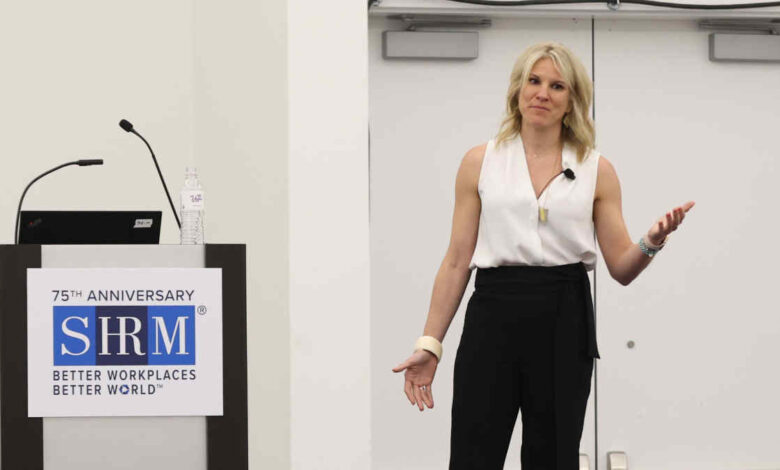Tips for HR Professionals to Protect Their Mental Health

In the fall of 2020, Carol Schulte’s life imploded.
She was handcuffed, placed in back of a police car and committed to a psychiatric unit after experiencing a manic episode. Over the next several months, Schulte saw the inside of five different hospitals and rehabilitation centers to treat her bipolar disorder.
Upon her release, Schulte continued to struggle. She dealt with full-blown depression that caused her to not want to get out of bed. Most days, she cried for hours. She often tried to wear a smile despite her swirl of negative emotions.
“This isn’t a woe-is-me story,” said Schulte, founder of The BRĀV Initiative, a Toronto-based organization dedicated to empowering female leaders. “But nothing is ever completely as it seems. There’s always something more below the surface. And it’s okay not to be okay.”
Schulte, a personal-development trainer, spoke about actionable strategies to create supportive workplaces and how HR professionals need to be cognizant of their own mental health during a preconference workshop, “It’s Okay Not to be Okay: How to Identify, Address and Navigate Mental Health in the Workplace,” at the SHRM Annual Conference & Expo 2023 in Las Vegas on June 11.
Helping Employees with Mental Health Problems
Employees globally reported feeling more stressed in 2021 than they were in 2020, according to a
report by U.S. Surgeon General Vivek H. Murthy. The report referred to a survey of 1,500 U.S. adult workers showing that 76 percent of respondents had at least one symptom of a mental health condition—an increase of 17 percentage points in two years.
Workplace signs and symptoms of mental health problems include:
- Consistently late arrivals or frequent absences.
- General lack of cooperation.
- Decreased productivity.
- Complaints of fatigue.
- Making excuses for missing deadlines.
- Working excessive overtime.
“It’s an invisible illness,” Schulte added. “And not a lot of people get the support they need, because they deal with a lot of shame, guilt and embarrassment.”
She explained that HR professionals can help employees experiencing mental health issues in several ways:
- Assess for risk of harm.
- Listen nonjudgmentally.
- Give reassurance and information.
- Encourage appropriate professional help.
- Refer them to self-help and other support strategies.
Schulte emphasized the importance of exhibiting empathy, which increases trust among workers. She explained that trust plays a significant role in reducing stress, creating a safe space for all employees and forging a healthy company culture.
“Get comfortable in the discomfort,” Schulte said. “[Discussing mental health] is a hard conversation. But poor mental health is not going anywhere anytime soon.”
HR Pros: Take Care of Yourself, Too
Attending the workshop was Laura Mizzi, SHRM-SCP, the HR manager of occupation health, wellness and safety at the Ontario Shores Centre for Mental Health Sciences in Whitby, Ontario. She commended Schulte for sharing her own struggles with mental illness.
“Carol sharing her own story helps set the tone,” Mizzi said. “It allows people to be more relatable and be vulnerable, especially HR professionals.”
Schulte covered five key behaviors that influence the mental health of HR professionals and explained why each can be detrimental to a person’s health:
- Perfectionism. “If things are not perfect, do we feel stress? Recognize that perfectionism serves a purpose, but it prevents innovation and creativity. It’s okay to not be perfect all the time.”
- People-pleasing. “As HR professionals, you’re good at people pleasing. We want to get that approval. But we need to give ourselves validation and to know that we’re good enough.”
- Paralleling. “We often compare ourselves to others, but we’re comparing our behind-the-scenes to everybody else’s highlight reels. Comparisons can be dangerous.”
- Proving. “Proving and pretending that you have it ‘all together’ can be exhausting. Just be you. Show up as yourself, because that is more than enough.”
- Procrastinating. “We’re often waiting for our ducks to be in a row or for that perfect moment. But understand that procrastinating can hold us back.”
She said these behaviors can lead to burnout, which is common among HR professionals. She provided several quick self-care exercises that can help HR professionals deal with their own mental health issues:
| One-minute activities: | Five-minute activities: | 30-minute activities: |
|
|
|
Schulte asked the crowd if anybody has ever worked on a Sunday, checked their e-mail while at their child’s sporting event or checked their e-mail late at night. Nearly every hand went up. She implored the audience members to “set boundaries” to protect their own mental health.
“You have to make sure you’re looking after yourself first,” she said. “You need to make sure you’re going into every conversation and engagement at your best.”




